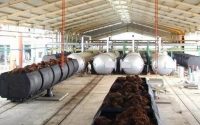Lei Jing: Introducing b20 biodiesel or train policy next year
Datuk Leijing, Minister of International Trade and Industry, said that the Ministry of Trade and Industry and the Ministry of Industry and Industry are looking to introduce B20 biodiesel with higher palm oil content in 2020. The two departments are also studying whether to map the B20/B30 biofuels. Tools are incorporated into the national automotive policy.
He said that Malaysia, as a major producer of palm oil in the world, will ensure that palm oil continues to be a sustainable and environmentally friendly alternative fuel for the world market.
Lei Jing issued a statement today that palm oil is a viable option for China to reduce its dependence on fossil fuels because palm oil has great potential as a renewable energy source.
“As the world’s largest palm oil exporter and second largest producer, we are committed to ensuring that this raw product sector can evolve into an industry that benefits the global market, especially the energy and transportation ecosystem.”
Biofuels as a viable option for fossil fuels have recently received significant attention because biofuels are derived from crops and can be used to achieve sustainable renewable energy through planting harvests. In contrast, fossil fuels are exhaustive energy that takes millions of years to generate and consumes much faster than the rate of build-up.
In addition, biofuels have carbon neutral properties because the carbon dioxide consumed in the process of growing biofuel feedstocks can offset the carbon footprint.
Lei Jing said that Malaysian Palm Oil Bureau, Malaysian Automobile, Robotics and Internet of Things Research Institute, Malaysian Standards and Industrial Research Institute (SIRIM) and other institutions have the technical ability to enhance the competitiveness of palm oil in renewable energy worldwide.
Malaysia introduced B10 biofuels in the local transportation market in December 2018, and the palm oil content increased from 7% to 10% of B7 biofuels.


